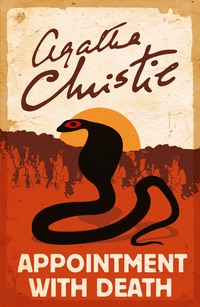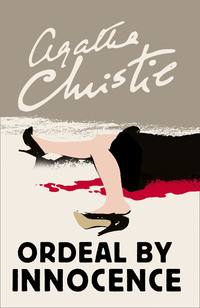
Полная версия
The Murder on the Links
Gently he picked away the fragments of broken glass. Suddenly his face changed to one of utter stupefaction.
‘Mon Dieu!’ he ejaculated.
‘What is it?’
‘The hands of the watch point to seven o’clock!’
‘What?’ cried the examining magistrate, astonished.
But Poirot, deft as ever, took the broken trinket from the startled commissary, and held it to his ear. Then he smiled.
‘The glass is broken, yes, but the watch itself is still going.’
The explanation of the mystery was greeted with a relieved smile. But the magistrate bethought him of another point.
‘But surely it is not seven o’clock now?’
‘No,’ said Poirot gently, ‘it is a few minutes after five. Possibly the watch gains, is that so, madame?’
Mrs Renauld was frowning perplexedly.
‘It does gain,’ she admitted. ‘But I’ve never known it gain quite so much as that.’
With a gesture of impatience the magistrate left the matter of the watch and proceeded with his interrogatory.
‘Madame, the front door was found ajar. It seems almost certain that the murderers entered that way, yet it has not been forced at all. Can you suggest any explanation?’
‘Possibly my husband went out for a stroll the last thing, and forgot to latch it when he came in.’
‘Is that a likely thing to happen?’
‘Very. My husband was the most absent-minded of men.’
There was a slight frown on her brow as she spoke, as though this trait in the dead man’s character had at times vexed her.
‘There is one inference I think we might draw,’ remarked the commissary suddenly. ‘Since the men insisted on Monsieur Renauld dressing himself, it looks as though the place they were taking him to, the place where “the secret” was concealed, lay some distance away.’
The magistrate nodded.
‘Yes, far, and yet not too far, since he spoke of being back by morning.’
‘What time does the last train leave the station of Merlinville?’ asked Poirot.
‘11.50 one way, and 12.17 the other, but it is more probable that they had a motor waiting.’
‘Of course,’ agreed Poirot, looking somewhat crestfallen.
‘Indeed, that might be one way of tracing them,’ continued the magistrate, brightening. ‘A motor containing two foreigners is quite likely to have been noticed. That is an excellent point, Monsieur Bex.’
He smiled to himself, and then, becoming grave once more, he said to Mrs Renauld:
‘There is another question. Do you know anyone of the name of “Duveen”?’
‘Duveen?’ Mrs Renauld repeated thoughtfully. ‘No, for the moment, I cannot say I do.’
‘You have never heard your husband mention anyone of that name.’
‘Never.’
‘Do you know anyone whose Christian name is Bella?’
He watched Mrs Renauld narrowly as he spoke, seeking to surprise any signs of anger or consciousness, but she merely shook her head in quite a natural manner. He continued his questions.
‘Are you aware that your husband had a visitor last night?’
Now he saw the red mount slightly in her cheeks, but she replied composedly:
‘No, who was that?’
‘A lady.’
‘Indeed?’
But for the moment the magistrate was content to say no more. It seemed unlikely that Madame Daubreuil had any connection with the crime, and he was anxious not to upset Mrs Renauld more than necessary.
He made a sign to the commissary, and the latter replied with a nod. Then rising, he went across the room, and returned with the glass jar we had seen in the outhouse in his hand. From this he took the dagger.
‘Madame,’ he said gently, ‘do you recognize this?’
She gave a little cry.
‘Yes, that is my little dagger.’ Then she saw the stained point, and she drew back, her eyes widening with horror. ‘Is that—blood?’
‘Yes, madame. Your husband was killed with this weapon.’ He removed it hastily from sight. ‘You are quite sure about its being the one that was on your dressing-table last night?’
‘Oh, yes. It was a present from my son. He was in the Air Force during the War. He gave his age as older than it was.’ There was a touch of the proud mother in her voice. ‘This was made from a streamline aeroplane wire, and was given to me by my son as a souvenir of the War.’
‘I see, madame. That brings us to another matter. Your son, where is he now? It is necessary that he should be telegraphed to without delay.’
‘Jack? He is on his way to Buenos Aires.’
‘What?’
‘Yes. My husband telegraphed to him yesterday. He had sent him on business to Paris, but yesterday he discovered that it would be necessary for him to proceed without delay to South America. There was a boat leaving Cherbourg for Buenos Aires last night, and he wired him to catch it.’
‘Have you any knowledge of what the business in Buenos Aires was?’
‘No, monsieur, I know nothing of its nature, but Buenos Aires is not my son’s final destination. He was going overland from there to Santiago.’
And, in unison, the magistrate and the commissary exclaimed:
‘Santiago! Again Santiago!’
It was at this moment, when we were all stunned by the mention of that word, that Poirot approached Mrs Renauld. He had been standing by the window like a man lost in a dream, and I doubt if he had fully taken in what had passed. He paused by the lady’s side with a bow.
‘Pardon, madame, but may I examine your wrists?’
Though slightly surprised at the request, Mrs Renauld held them out to him. Round each of them was a cruel red mark where the cords had bitten into the flesh. As he examined them, I fancied that a momentary flicker of excitement I had seen in his eyes disappeared.
‘They must cause you great pain,’ he said, and once more he looked puzzled.
But the magistrate was speaking excitedly.
‘Young Monsieur Renauld must be communicated with at once by wireless. It is vital that we should know anything he can tell us about this trip to Santiago.’ He hesitated. ‘I hoped he might have been near at hand, so that we could have saved you pain, madame.’ He paused.
‘You mean,’ she said in a low voice, ‘the identification of my husband’s body?’
The magistrate bowed his head.
‘I am a strong woman, monsieur. I can bear all that is required of me. I am ready—now.’
‘Oh, tomorrow will be quite soon enough, I assure you—’
‘I prefer to get it over,’ she said in a low tone, a spasm of pain crossing her face. ‘If you will be so good as to give me your arm, doctor?’
The doctor hastened forward, a cloak was thrown over Mrs Renauld’s shoulders, and a slow procession went down the stairs. M. Bex hurried on ahead to open the door of the shed. In a minute or two Mrs Renauld appeared in the doorway. She was very pale, but resolute. Behind her, M. Hautet was clacking commiserations and apologies like an animated hen.
She raised her hand to her face.
‘A moment, messieurs, while I steel myself.’
She took her hand away and looked down at the dead man. Then the marvellous self-control which had upheld her so far deserted her.
‘Paul!’ she cried. ‘Husband! Oh, God!’ And pitching forward she fell unconscious to the ground.
Instantly Poirot was beside her, he raised the lid of her eye, felt her pulse. When he had satisfied himself that she had really fainted, he drew aside. He caught me by the arm.
‘I am an imbecile, my friend! If ever there was love and grief in a woman’s voice, I heard it then. My little idea was all wrong. Eh bien! I must start again!’
Конец ознакомительного фрагмента.
Текст предоставлен ООО «ЛитРес».
Прочитайте эту книгу целиком, купив полную легальную версию на ЛитРес.
Безопасно оплатить книгу можно банковской картой Visa, MasterCard, Maestro, со счета мобильного телефона, с платежного терминала, в салоне МТС или Связной, через PayPal, WebMoney, Яндекс.Деньги, QIWI Кошелек, бонусными картами или другим удобным Вам способом.














